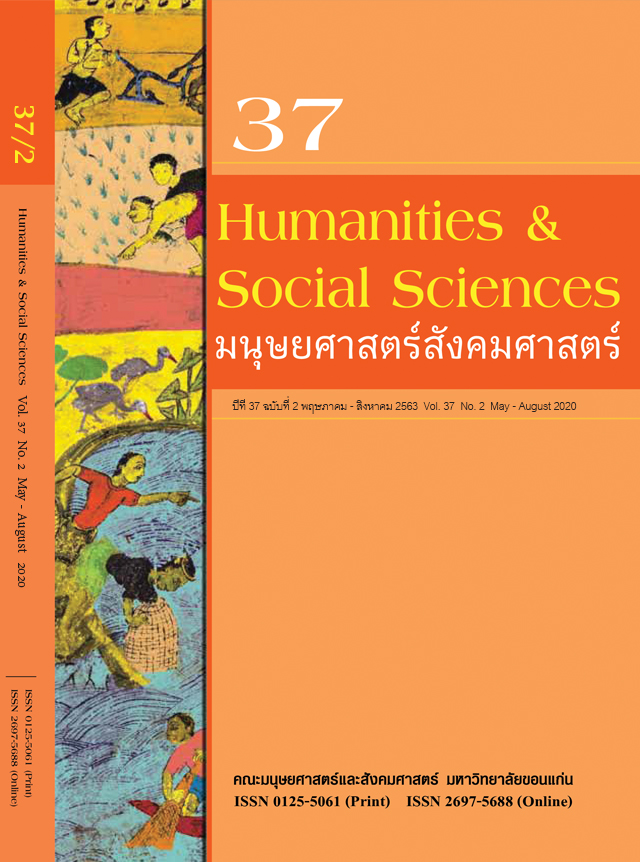“บ้าน” ของชาวมอญวังกะ : ความหมายและเงื่อนไขเบื้องหลังการให้นิยาม
The Notions of “Home” of Mon people at Baan Wang Ka: Meanings and Conditions of Given Definitions
Keywords:
notions of “home”, Mon people at Baan Wang Ka, diasporasAbstract
This research article contributes to various fields of study including Mekong Studies, Anthropology and Ethnic Studies. Its purpose is to explain the meanings “home” of Mon people at Baan Wang Ka and the conditions of the given definitions. The study applied the concept of diaspora as a framework; data include literature on Mon history and fieldwork. Qualitative research methodology was employed; data collection was conducted during 2014-2015 at Baan Wang Ka, Hnongloo Sub-district, Sangkhlaburi District, Kanchanaburi Province. The results indicated that Mon people at Baan Wang Ka migrated from Mon State in Myanmar to Thailand in 1948. The migration was forced by the fighting between the Burma Army and the ethnic armed forces. In the later periods, there were also Myanmar migrants looking for better economic opportunities. Although the causes of migration were different, the statuses of Mon people at Baan Wang Ka were diasporas and the heirs of diasporas from Myanmar. Drawn on their status of being diasporas, their migration experience and experience of separation from homeland, Mon Baan Wang Ka have defined the term “home” in 4 ways: 1) “home” means Wang Ka (Bon) which refers to current village where they live their life; 2) Wang Ka (Lang) referring to home in memories that they cannot return to as the village was flooded due the construction ofDam; 3) Mokka Niang and Chao Khae Lay which are the hometowns in Myanmar and 4) home referring to the motherland in history and memories of the ancient Mon Kingdom. A variety of meanings of the term “home” were given not solely from differences of generations of poeple and the reasons of migration, but there were complex conditions/factors behind the given definitions. Such conditions/factors include the status in Thailand, the integration into Thai society, legal status, economic opportunities and experiences at the individual level. Thus the notions of “home” are diverse and they are constructed under social and economic contexts rather than being static and specifically determined meaning.
Keywords: Notions of Home, Mon People , Wang Ka, Diaspora
References
กัลยา จุฬารัฐกร. (2551). เรื่องเล่าคนพลัดถิ่น: กรณีศึกษาผู้หญิงม้งพลัดถิ่นกลุ่มหนึ่ง ในอำเภอเมืองเชียงใหม่. วิทยานิพนธ์ปริญญาศิลปศาสตรมหาบัณฑิต สาขาวิชาการพัฒนาสังคม บัณฑิตวิทยาลัยมหาวิทยาลัยเชียงใหม่.
เกษม เพ็ญภินันท์. (2552). ความโกลาหลของวัฒนธรรมศึกษา. ใน สุวรรณา เกรียงไกรเพ็ชร์ (บรรณาธิการ). ความโกลาหลของวัฒนธรรมศึกษายกเครื่องเรื่องวัฒนธรรมศึกษา. (หน้า 11-105). กรุงเทพฯ: ศูนย์มานุษยวิทยาสิรินธร (องค์การมหาชน).
ฐิรวุฒิ เสนาคำ. (2550). ไทยพลัดถิ่นกับข้อจำกัดขององค์ความรู้ว่าด้วยรัฐชาติในสังคมไทย. วิทยานิพนธ์ปริญญารัฐศาสตรดุษฎีบัณฑิต สาขาวิชารัฐศาสตร์ บัณฑิตวิทยาลัย มหาวิทยาลัยธรรมศาสตร์.
นิชธิมา บุญเฉลียว. (2552). ความทรงจำร่วมของคนลื้อพลัดถิ่นกับประเพณีประดิษฐกรรม. วิทยานิพนธ์ปริญญาศิลปศาสตรมหาบัณฑิต สาขาวิชาการพัฒนาสังคม บัณฑิตวิทยาลัย มหาวิทยาลัยเชียงใหม่.
นิธิ เอียวศรีวงศ์. (2546). มอญศึกษา. ศิลปวัฒนธรรม, 25(2), 128-132.
บัณฑิต ไกรวิจิตร. (2549). ชีวิตพลัดถิ่น: คนคาเร็นนีที่เข้ามาอยู่ในจังหวัดแม่ฮ่องสอน. วิทยานิพนธ์ปริญญาสังคมวิทยาและมานุษยวิทยา สาขาวิชามานุษยวิทยา บัณฑิตวิทยาลัย มหาวิทยาลัย ธรรมศาสตร์.
มนต์ชัย ผ่องศิริและมณีมัย ทองอยู่. (2556). คนเข้าเมืองทั่วไปหรือคนพลัดถิ่น: การต่อรองนิยามตัวตนของไทยพลัดถิ่นในสังคมไทย. วารสารสังคมลุ่มน้ำโขง, 9(2), 1-24.
ยศ สันตสมบัติ. (2551). อำนาจ พื้นที่ และอัตลักษณ์ทางชาติพันธ์: การเมืองวัฒนธรรมของรัฐชาติในสังคมไทย. กรุงเทพฯ: ศูนย์มานุษวิทยาสิรินธร (องค์การมหาชน).
เย็นจิตร ถิ่นขาม และมณีมัย ทองอยู่. (2552). การผลิตซ้ำทางวัฒนธรรมข้ามพรมแดนในการแต่งงานข้ามวัฒนธรรมระหว่างหญิงไทยกับชายญี่ปุ่น. วารสารวิจัย มหาวิทยาลัยขอนแก่น, 9(4), 90-101.
รัตนา โตสกุล. (2552). เฮือนเคยอยู่ อู่เคยนอน ต้องจรจำลา : ชาวลาวลี้ภัยในสหรัฐอเมริกา. ใน สุวรรณา เกรียงไกรเพ็ชร์. (บรรณาธิการ). ความโกลาหลของวัฒนธรรมศึกษายกเครื่องเรื่องวัฒนธรรมศึกษา. (หน้า 179-361). กรุงเทพฯ: ศูนย์มานุษยวิทยาสิรินธร (องค์การมหาชน).
วัชรกิติ วัชโรทัย และคณะ. (2537). 84 ปี หลวงพ่ออุตตมะ. กรุงเทพฯ: อมรินทร์พริ้นติ้งแอนด์พับลิชชิ่ง.
สุกัญญา เบาเนิด. (2549). การสร้างอัตลักษณ์ของคนมอญย้ายถิ่น : ศึกษากรณีแรงงานข้ามชาติในจังหวัดสมุทรสาคร. วิทยานิพนธ์ปริญญามานุษยวิทยามหาบัณฑิต สาขาวิชามานุษยวิทยา บัณฑิตวิทยาลัย จุฬาลงกรณ์มหาวิทยาลัย.
สุจิตรา เปลี่ยนรุ่ง. (2553). การสื่อสารเพื่อสร้าง ธำรงรักษา และต่อรองอัตลักษณ์ความเป็นมอญของกลุ่มชาวมอญพลัดถิ่น ในเมืองไทยท่ามกลางกระแสโลกาภิวัตน์. วิทยานิพนธ์ปริญญา นิเทศศาสตรดุษฎีบัณฑิต สาขาวิชานิเทศศาสตร์ บัณฑิตวิทยาลัย จุฬาลงกรณ์มหาวิทยาลัย.
หม่องทิน อ่อง. (2519). ประวัติศาสตร์พม่า. (เพ็ชรี สุมิตร, ผู้แปล). กรุงเทพฯ: สมาคมสังคมศาสตร์แห่งประเทศไทย.
องค์ บรรจุน. (2550). สตรีมอญในราชสำนักสยามสมัยรัตนโกสินทร์ พ.ศ.2325-2475. วิทยานิพนธ์ศิลปศาสตรมหาบัณฑิต สาขาวิชาประวัติศาสตร์ไทย บัณฑิตวิทยาลัย มหาวิทยาลัย ศรีนครินทรวิโรฒ.
อรวรรณ ทับสกุล. (2546). หลวงพ่ออุตตมะ : ผู้นำทางวัฒนธรรมกับการเปลี่ยนแปลงทางสังคมและวัฒนธรรมของหมู่บ้านวังกะ. วิทยานิพนธ์ปริญญาสังคมวิทยาและมานุษยวิทยามหาบัณฑิต สาขาวิชามานุษยวิทยา บัณฑิตวิทยาลัย มหาวิทยาลัยศิลปากร.
ออมสิน บุญเลิศ. (2551). การต่อรองและปรับตัวของคนพลัดถิ่น: การณีศึกษาชาวไทใหญ่พลัดถิ่นในเมืองเชียงใหม่. วิทยานิพนธ์ปริญญาศิลปศาสตรมหาบัณฑิต สาขาวิชาการพัฒนาสังคม บัณฑิตวิททยาลัย มหาวิทยาลัยเชียงใหม่.
Cohen, R. (2008). Global Diasporas: An Introduction. International Migration Review. London: Routledge.
Guillon, E. (1999). The Mons: a civilization of Southeast Asia. Bangkok: Siam Society under Royal Patronage.
Hall, S. (1990). Cultural identity and diaspora. In Rutherford, J. (Ed.). Identity: Community, Culture, Difference. (pp.222-237). London: Lawrence & Wishart.
Nonini, D.M., & Ong, A. (2003). Chinese Transnationalism as an Alternative Modernity. In Nonini, D.M., & Ong, A. (Ed.). Ungrounded Empires: The Cultural Politics of Modern Chinese Transnationalism. (pp.3-26). New York: Routledge.
P. Cohen (1999) Rethinking the Diasporama, Patterns of Prejudice, 33:1, 3-22, DOI: 10.1080/003132299128810461
Safran, W. (1991). Diasporas in Modern Societies: Myths of Homeland and Return. Diaspora. Journal of Transnational Studies, 1(1), 83–99.
สัมภาษณ์
มองมิน. (ชื่อสมมติ). (18 เมษายน 2558). สัมภาษณ์. ชาวมอญบ้านวังกะ อำเภอสังขละบุรี จังหวัดกาญจนบุรี.
มินบู. (ชื่อสมมติ). (6 เมษายน 2557). สัมภาษณ์. ชาวมอญบ้านวังกะ อำเภอสังขละบุรี จังหวัดกาญจนบุรี.
นิรันดร (ชื่อสมมติ). (10 เมษายน 2557). สัมภาษณ์ ชาวมอญบ้านวังกะ อำเภอสังขละบุรี จังหวัดกาญจนบุรี.
ขิ่นมู (ชื่อสมมติ). (12 เมษายน 2557). สัมภาษณ์ ชาวมอญบ้านวังกะ อำเภอสังขละบุรี จังหวัดกาญจนบุรี.
ส่วย (ชื่อสมมติ). (11 เมษายน 2557). สัมภาษณ์ ชาวมอญบ้านวังกะ อำเภอสังขละบุรี จังหวัดกาญจนบุรี.
จินดา (ชื่อสมมติ). (14 กรกฎาคม 2557). สัมภาษณ์ ชาวมอญบ้านวังกะ อำเภอสังขละบุรี จังหวัดกาญจนบุรี.
มินจี (นามสมมติ), (10 ตุลาคม 2558). สัมภาษณ์ ชาวมอญบ้านวังกะ อำเภอสังขละบุรี จังหวัดกาญจนบุรี.
อะปอง (ชื่อสมมติ), (8 เมษายน 2558). สัมภาษณ์ ชาวมอญบ้านวังกะ อำเภอสังขละบุรี จังหวัดกาญจนบุรี.
มูเช (ชื่อสมมติ). (17 เมษายน 2558). สัมภาษณ์ ชาวมอญบ้านวังกะ อำเภอสังขละบุรี จังหวัดกาญจนบุรี.
น้ำผึ้ง (นามสมมติ). (20 กรกฎาคม 2558). สัมภาษณ์ ชาวมอญบ้านวังกะ อำเภอสังขละบุรี จังหวัดกาญจนบุรี.
ทุน (ชื่อสมมติ). (15 เมษายน 2558). สัมภาษณ์ ชาวมอญบ้านวังกะ อำเภอสังขละบุรี จังหวัดกาญจนบุรี.



